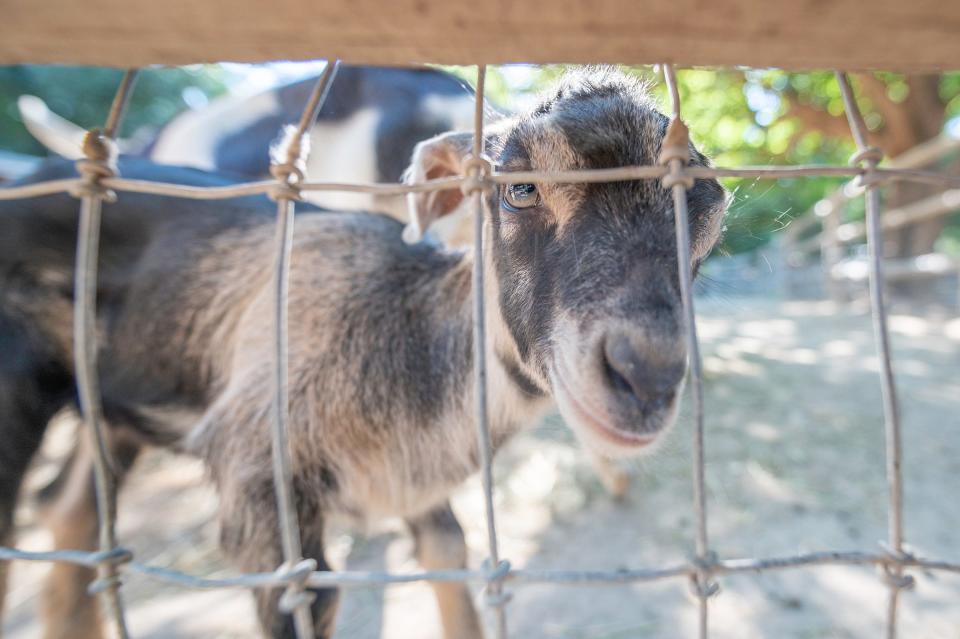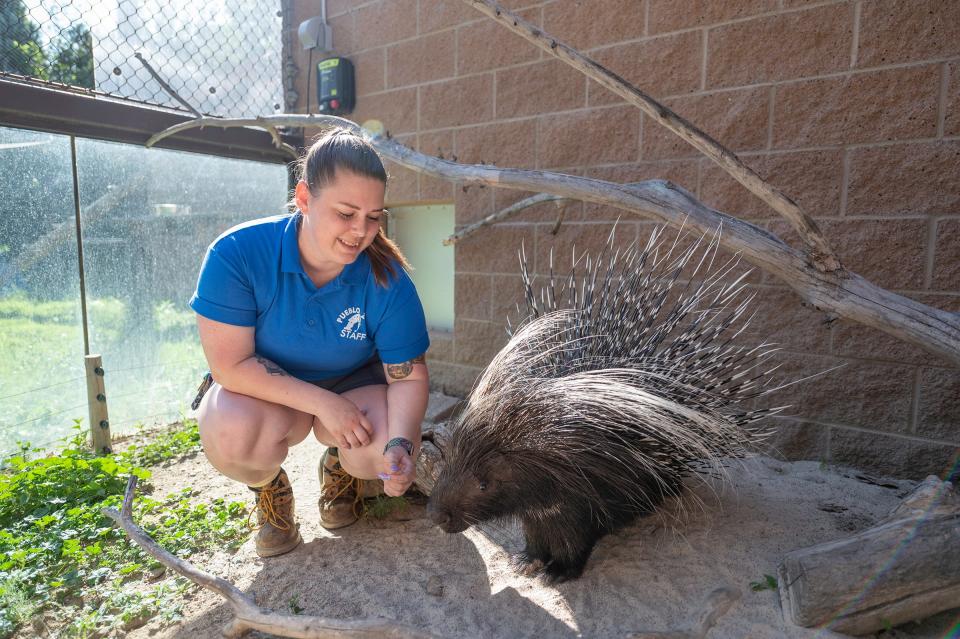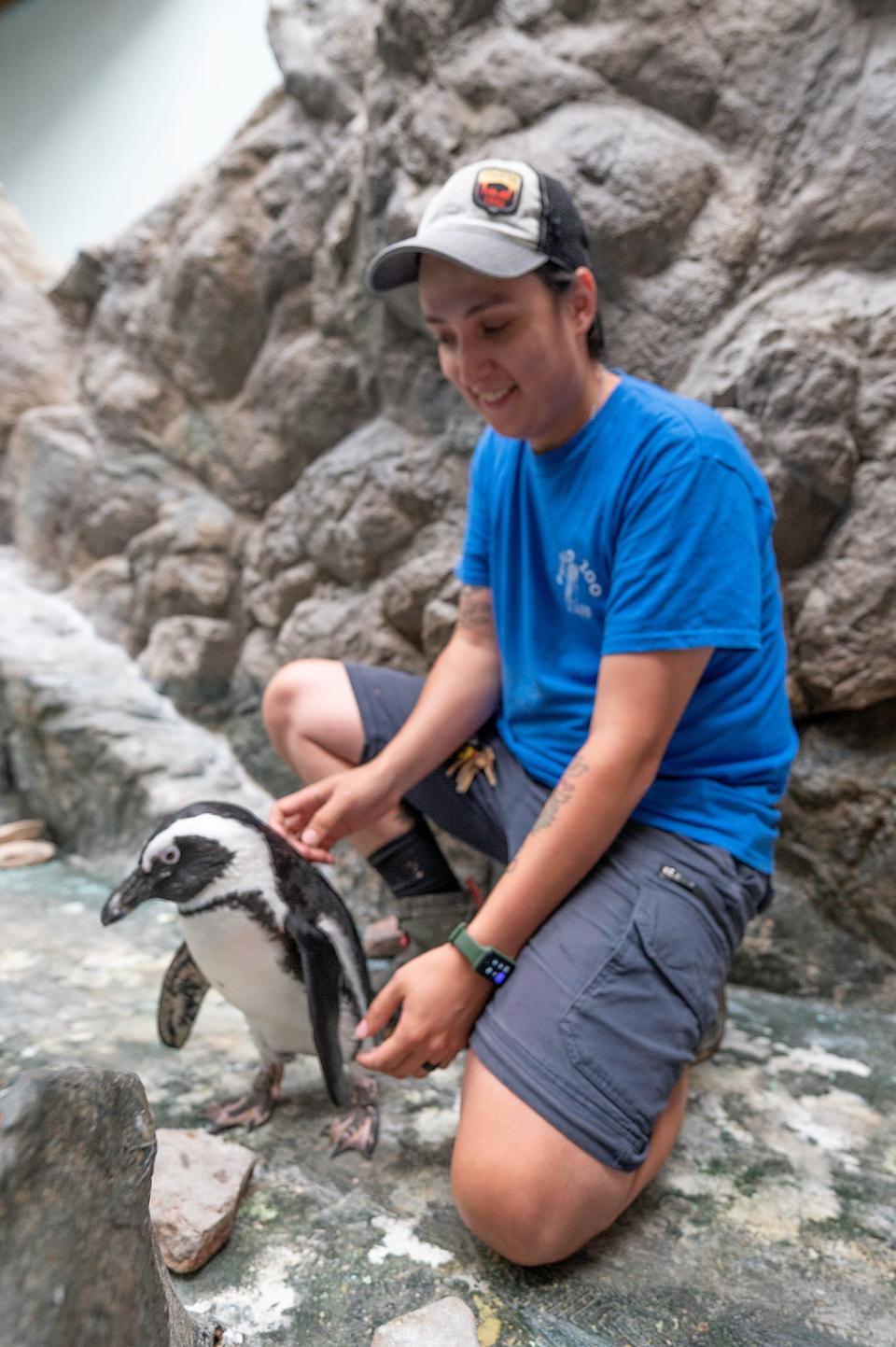Pueblo zookeepers talk baby goats, penguin love triangles and more for National Zookeeper Week
The Pueblo Zoo and its zookeepers are celebrating National Zookeeper Week, which honors their efforts to care for animals as well as their passion for the profession.
The Chieftain recently sat down with zookeepers Kayla Newman and Felipe Badilla to ask them about their roles and experiences at the Pueblo Zoo and what role the public can play in supporting wildlife conservation.
Each keeper has spent at least a year learning the ins and outs of zookeeping and said they were attracted to the profession because of their desire to care for animals.
These interviews have been edited for length and clarity.
We just spent some time with the baby goats. What is a zookeeper’s role when the zoo has a newborn?
Newman: It always looks different. With the goats specifically, we’re hands-off and letting mom (handle) it and monitoring if we need to step in. She’s been doing a great job so far, so we haven’t really needed to do anything. But there could be times where mom doesn’t really know what’s going on because it’s her first time, so we have to be a little more hands-on and interactive to make sure that baby has the best chance.

What’s the relationship like between a zookeeper and an animal they care for?
Newman: I would say the relationship is very special. It’s very rewarding for keepers. I’d love to say that for the animals, too, but I can’t speak for them. (Laughs.) It’s a really special bond that we get to form. It’s exciting to form those bonds and then be able to teach the public why it’s so important we save their native habitats and conservation. The bonds we form really drive that message home to the public.
Badilla: It’s a very nice and understanding type of bond. We understand that they’re still wild animals, and that if they choose to not participate in anything or to not be in your presence, as the keeper, you understand it’s not offensive (toward you). They just want their space and to feel safer elsewhere.
Is there training involved between zookeepers and animals?
Newman: Training is a very big priority for us. It’s really important for an animal’s mental health and keeps them focused. It also helps us provide better care for them because we can train them to do voluntary veterinary procedures. We train them behaviors that allow us to make vet visits less stressful on them and us. They get to participate in their own care, which is very exciting for them.

How does a zookeeper go about engaging the audience during a public demonstration?
Newman: During our keeper chats, typically there’s a training session, so the public gets to watch that. Then we go and talk about each behavior that they just saw and how it helps the animal and us provide better care for them. We can explain why a behavior is helpful so that we don’t have to necessarily anesthetize to do a physical exam on an animal. We can just ask them to present a certain part of their body that we need.
That usually leads to questions about their native habitats, so then we can talk about conservation and how, even though we’re in Colorado and African painted dogs are in Africa, there’s a lot we can do here to help them over there.

Badilla: I usually give some quick facts about penguins and then I ask what kind of questions they have because kids have the most random, fun questions that you can get. Otter chat is different because they’re right there, and when we do it, we usually have their fish in hand, and we’ll toss them a fish while they're in the water, so that’s visually appealing.
We also do a more personal one, so we’ll explain that right now, for penguins, there’s a love triangle going on, because everyone loves to hear about the drama that goes on.
Is it like 'The Bachelor' or 'The Bachelorette'?
Badilla: It really is sometimes. If you make the rounds or come back to the zoo, there are dark blue band penguins, and (Haezo) has that band. She kind of is a free spirit, so to say. In human care, penguins are seen with less than one mate more often than not. For whatever reason, since January, (Haezo) has already been with three different penguins. This morning, she was found in a separate male’s nest box and not her and her mate’s nest box.
It’s stuff like that that people enjoy hearing. I mean, it’s entertaining for us, so I’m sure it’s very entertaining for the public to hear that.
Are there any notable perks or fun moments about the job that the public might not know about?
Newman: The whole thing. (Laughs.) It’s not glamorous by any means, but we make the most of it and we always have fun. The animals, they have their routine, but you never know what’s going to happen. Sometimes, just like us, they have a day, and that’s frustrating or hilarious. You just never know what you’re really going to get. You could be doing the same routine day in and day out and it’s different every time.
Badilla: Enrichment, that’s always a fun one. If you’re very creative, it’s enriching for the animal. If you use that to make something fun for them, and they actually use it, it’s super exciting because then you’re like, “Yes! You’re doing it, you’re doing it!”
There are a lot of signs around the zoo that highlight wildlife conservation. Why is that such an emphasis at the Pueblo Zoo?
Newman: It’s really important to us to teach the public about conservation because that is such a core of our mission here. There is a lot that we can do in Colorado to help wild animals across the globe. Conservation is such a huge thing that even to me it can seem very daunting. But it’s really important that we teach the public that one tiny thing is like a drop in the bucket and it’s going to create a giant ripple.
And it isn’t just outside of (Colorado). There’s plenty of things we need to do for conservation here. We live in a very wildlife-forward state, which is great, but our animals here still do need protection.
Chieftain reporter Josue Perez can be reached at JHPerez@gannett.com. Follow him on Twitter @josuepwrites. Support local news, subscribe to The Pueblo Chieftain at subscribe.chieftain.com.
More: The Pueblo Zoo wants to upgrade its security systems with $102,000 in federal money
This article originally appeared on The Pueblo Chieftain: Pueblo zookeepers dish on penguin love triangles, baby goats and more

